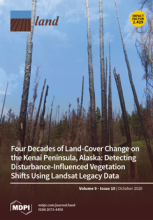Land Library
Bienvenue dans la bibliothèque du Land Portal. Explorez notre vaste collection de ressources en libre accès (plus de 74 000), comprenant des rapports, des articles scientifiques, des articles de recherche, des publications évaluées par des pairs, des documents juridiques, des vidéos et bien plus encore.
/ library resources
Showing items 1 through 9 of 14.Agricultural development is determined by various factors, such as environmental, economic, demographic, or social circumstances. In order to present the level of this development as com-prehensively as possible, a multidimensional analysis should be carried out with an appropriate methodology.
It is commonly believed that the impacts of human activities have decreased the natural vegetation cover, while some promotion of the vegetation growth has also been found.
This article analyses the contribution to local development by women workers in the fruit- and vegetable-handling sector in Almería (Spain) over the last five years (2015–2019). It is a continuation of research carried out during the period 2000–2014.
Women and youths encounter problems with access to land, as well as securing tenure in land resources [...]
We set out to unveil gender inequality with respect to women’s access to family land following the surge in tree-planting in selected villages in the Southern Highlands of Tanzania.
Although land forms the basis for marginal livelihoods in Sub-Saharan Africa, the asset is more strategic for women as they usually hold derived and dependent rights to land in customary tenure areas.
Peri-urban agriculture (PUA) has been widely regarded as a sub-field of multifunctional agriculture for improving the sustainability of urban environments. However, urban sprawl has both negative and positive effects on peri-urban farming, and the research on this issue in Japan is insufficient.
An increasing number of African States are recognizing customary land tenure. Yet, there is a lack of research on how community rights are recognized in legal and policy frameworks, how they are implemented in practice, and how to include marginalized groups.
Women are an underappreciated economic force who, when empowered by association with a female organization, can be a catalyst for development.






